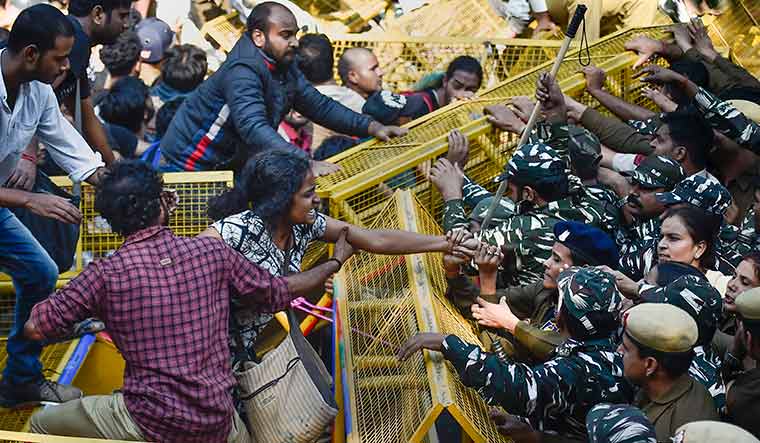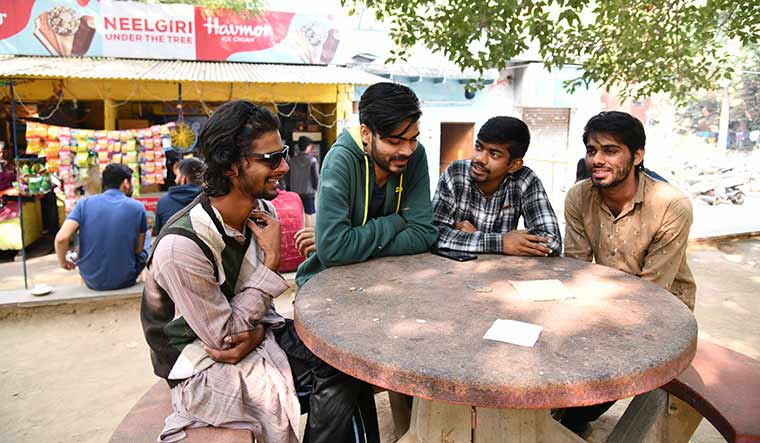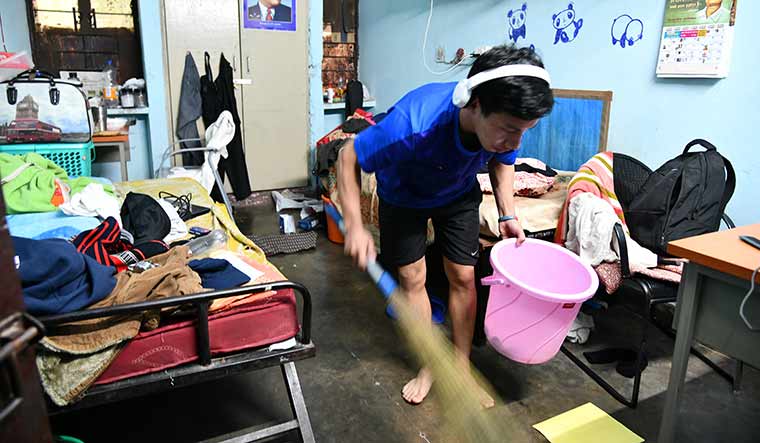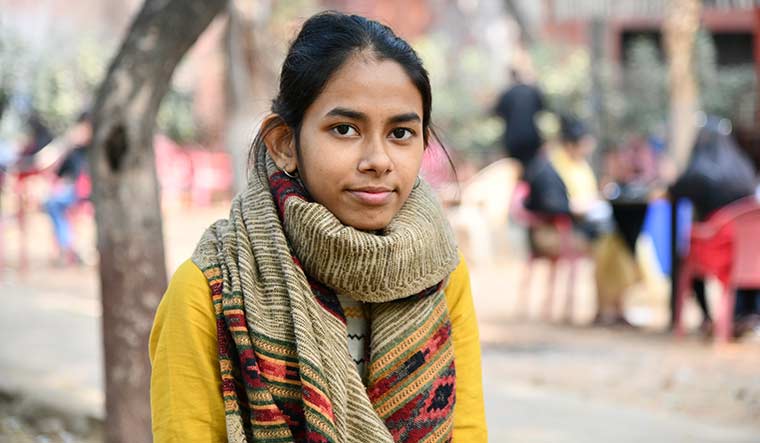On a rainy afternoon in July 1998, the postman brought two letters addressed to Burton Cleetus at his house in Kerala’s Kollam district. One was a job offer as a schoolteacher in the Maldives. The other was from Jawaharlal Nehru University, offering him a seat in its postgraduate programme in history. The family was broke and his parents wanted Cleetus to take up the job offer. But he convinced them that JNU would not cost much and that he would take up a part-time job. Two weeks later, Cleetus took a train to Delhi with less than Rs1,000 with him.
“That part-time job never worked out,” said Cleetus, who is now an assistant professor of history at JNU. “But my monthly expenses never crossed Rs700-800. Without those subsidised rates, I would never have been able to study at JNU. Back then, many of my batchmates were just like me. One raised money by selling his family’s cow and he survived on that money for nearly a year. JNU somehow ensured that poverty never stopped anyone from chasing their dreams.”
But that model could be coming to an end soon with the JNU administration, led by vice-chancellor M. Jagadesh Kumar, ordering a massive fee hike in October that could make the university unaffordable for the poor and the lower middle class. The rent for a single-seater room was increased from Rs20 per month to Rs600 per month, while the rent for a double-seater went up to Rs300 per month from Rs10. Service charges of Rs1,700 (approximate, actuals to be paid) were introduced, along with water and electricity charges. Following huge protests and an intervention from the Union government, there has been a partial rollback in the room rent for eligible poor students, but the sustained assault on the manner in which JNU has functioned since its inception continues. And, it shows.
The JNU campus now looks completely different. The North Gate, the main entrance to the campus that used to welcome visitors of all political and social persuasions with open arms, is ringed by layers of security. Stern security guards subject all visitors to a rigorous round of grilling. It is almost as if you are stepping into a high-security military zone, not a liberal, public university. Inside, the students are strangely subdued. One can still detect the embers of JNU’s renowned fighting spirit, but wariness is setting in. “My life as a student will end if the fee hike is not rolled back. Perhaps, there is no point in living anymore,” said Arvind Kumar, a PhD scholar from Begusarai in Bihar. “I am fed up with this uncertainty. I do not know how long we will be able to fight against this arbitrary fee hike.” Son of a dalit labourer, he was the first in his family to finish school.
“My parents were estate workers from the high ranges of Kerala, and they could not spare even Rs1,000 a month for my education,” said Raju K.D., who completed his PhD in 2007. “Without JNU’s subsidised fees and welcoming culture I would not have reached where I am today.” Now professor of law at IIT Kharagpur, he is one of India’s leading experts in intellectual property rights.
JNU was set up in 1969 also keeping in mind students such as Cleetus, Arvind and Raju. Its founding fathers wanted “education in this university [to] be one hundred per cent free for a thousand of the best young people we can select”. JNU was conceived as “a space for systematic thought, free of partisan pressure which might stifle intellectual creativity”, and would “create a community, a continuing membership of minds devoted to the tasks of learning and of the good life, inspired by love and guided by knowledge”. And, that is what JNU, with all its blemishes, has been doing, but the present administration seems to have a different vision for its future.
“Nearly 40 per cent of JNU students are from families that survive on less than Rs12,000 a month, and they live on equal terms with the rich and the privileged,” said A.K. Singh, who graduated from JNU a decade ago and now heads an NGO. “Here, the daughter of a manual scavenger will share a room with a Pandit’s daughter or the son of a poor Muslim and a rich Thakur will eat on the same table. That guarantee of equality will be the first casualty if the JNU administration goes ahead with its proposed fee hike.”
The fee hike, in that sense, is a calculated assault on the basic nature of JNU and its pro-poor DNA. “The debate is being framed in a shrewd manner,” said Aishe Ghosh, president of the JNU Students Union (JNUSU). “The hike is being projected as a modest one, with the administration highlighting the increase in the room rent to Rs300 a month, which might sound reasonable for people outside JNU. But the proposed hike, despite the rollback, will force many students to drop out. For many students who come from families that do not have the luxury of three meals a day, even an increase of Rs2,000 a month will be ill affordable.”
Shashibhushan Pandey, the visually-challenged student from Gorakhpur who garnered public attention after he was injured during the police action against students on November 18, called the ongoing crisis a result of the Narendra Modi government’s attempts to commodify everything. “Things of national importance like the petroleum and the telecom sector and even the railways are being handed over to private groups,” said Pandey, a second-year MA history student. “The state is also giving up its role in education. And once it is done, who will address our grievances? Ambani? Then why don’t we vote for Ambani himself? He might do a better job running this country.”
As to the charge that institutions like JNU are a burden on tax payers, Pandey said that it was a bogus claim by a small group of elites who pay income tax. “We also pay tax every time we buy something, even a bar of soap,” he said. “The share of indirect taxes is way higher than direct taxes like the income tax, and the government is spending a miniscule share of it on education.” He pointed out that JNU students being painted as an anti-national, immoral bunch is a classic case of vilification. “The government has failed to indulge us in an intellectual, ideological debate and hence such below-the-belt tactics,” he said.
But that seems to be working. An autorickshaw driver refused to take this correspondent to JNU, saying he would rather forego the fare than enter the “den of immoral, anti-national leeches”. There were a few demonstrations against JNU just outside the campus in which participants could be heard issuing death threats to students. Ghosh said the threats will not deter them. “The administration wants us to accept the new fees and move on. Or else, they want us to take some extreme step, which will give them an excuse to shut the university down. We need to be really careful about our next step,” said Ghosh. The administration, she said, was trying to suppress and sidestep the union. Najeeb V.R., a PhD student in sociology, said the administration refused to recognise the union last year saying that the winning candidates failed to submit GST details in their election expense bills. The union went to court against the decision and got it overruled. This time, the administration said the election was not held on the basis of recommendations by the J.M. Lyngdoh panel and refused to engage with it despite the ongoing crisis.
At the Sabarmati dhaba, THE WEEK met a group of students who were visibly worried about the prolonged unrest in the campus. But unlike in the past, they seemed scared of the administration. None of them wanted to be photographed or to speak on record. “It is a vindictive regime,” said a girl from the group. A PhD student from the school of languages, she said her fellowship could be stopped for speaking out. Her roommate, who studies sociology, said the administration did not want students from poor families to continue. “The idea is to remake JNU as just another urban university, an adda of the rich and the upper class who are more amenable to the right-wing ideology,” she said. “Already efforts are allegedly on to ensure that candidates with that particular bend of mind are recruited as faculty members. Please do an independent verification of the ideology, academic skills and competence of the teachers recruited in the last four years. Such teachers will soon have a majority in the JNU teachers association. They will also make sure that only pro-sangh students will be selected for PhD programmes.” Previous administrations, too, have recruited their favourite candidates, mostly leftists, she said, but most of them were brilliant academics.
Critics, however, said that the alleged onslaught of the RSS is the result of JNU’s past indiscretions, especially in faculty recruitments. “Earlier, candidates close to the head of each centre usually ended up getting selected. Fortunately, most of them were good candidates, but they were not always the best among those who applied,” said A. Vinod Kumar, former JNUite and presently fellow at the Institute of Defence Studies and Analyses. “Thus, JNU recruitments have always been a contested terrain with allegation of favouritism raked up on almost all appointments over the years.”
The administration, however, said the university’s financial woes forced it to hike hostel charges, which had remained the same for the past three decades, despite inflation and the rising cost of living. It said the university had run up a deficit of nearly Rs45 crore from electricity and water charges and salaries paid to contractual staff in the hostels. “With the University Grants Commission ordering us to meet the deficit using money generated by the university, the only option was to collect service charges,” said a teacher close to the administration.
The government, however, seems dissatisfied with the vice-chancellor’s handling of the situation. On November 18, the human resource development ministry set up a three-member committee, headed by former UGC chairman Prof V.S. Chauhan, to interact with all stakeholders and find ways to resolve the crisis. A section of the teachers, reportedly close to vice-chancellor Kumar, criticised the move, saying that it brazenly undermined his authority. On November 24, the administration set up its own high-level committee to explore ways to defuse the crisis.
The Chauhan committee submitted its report to the ministry on November 26. A senior official said the ministry would study the report before taking any action. “There are many recommendations, not just regarding the fee hike,” said the official. Meanwhile, the administration’s committee recommended a further 50 per cent reduction of hostel fees and utility charges and 75 per cent reduction for poor students. Service and utility charges are now capped at Rs1,000 per month, and at Rs500 for students below poverty line. The JNUSU, however, is going ahead with the strike, demanding a total withdrawal of fee hike.
The administration was forced to act perhaps because it was finding itself increasingly isolated. The ABVP, the student body of the RSS, also took out demonstrations against the fee hike, although independent of the JNUSU. While ABVP leaders were reluctant to speak on record, Amit Singh, who was part of the ABVP leadership in JNU in the early 2000s, said the VC’s decision was arbitrary and anti-student. “I concede JNU is facing a financial crisis. But after refusing to hike hostel fees for 30 years, the administration is trying to make up for it in one go. It is unacceptable and it should be rolled back,” said Amit, an assistant professor at ARSD College, Delhi University. He added that higher education in liberal arts and humanities cannot be sustained without subsidies, and it was the government’s duty to allocate sufficient funds for that.
Since its inception, JNU has seen political ideologies of all hues—from the extreme left to the far right—on campus, but the left, especially the Students Federation of India, the CPI(M)’s student wing, and the All India Students Association of the CPI (Marxist–Leninist) Liberation have had an outsized influence. CPI(M) general secretary Sitaram Yechury and former general secretary Prakash Karat were both student union presidents.
“Whenever, new students from Kerala and West Bengal joined, SFI leaders would assume that they were leftists,” recalled Cleetus. “Once a student from central Kerala was getting ready to vote in his first JNUSU elections. An SFI activist handed him a slip with the names of five SFI candidates to vote for. The guy, who was a Congress supporter back home, said the list helped him identify the SFI candidates and avoid voting for them even by mistake. The SFI leadership came to know about it very soon, but the only trouble he had to endure was an hour-long lecture from one of the teachers on the nuances of Marxism.”
Most of those leftist teachers were respected across the world for their intellectual heft. The administration is trying to replace them with people who are more in tune with their own ideological orientation. But, because of the left, liberal tilt of the Nehruvian era, institutions of higher education in liberal arts and the intellectual environment in the country have been dominated by leftist thoughts for a long time, leaving the Modi government with a limited conservative intellectual reservoir to tap into. Subsequently, many of the recent faculty appointments have been controversial. The teachers’ association has filed several cases challenging new appointments, alleging that the administration was trying to saffronise JNU.
“The RSS has never been comfortable with the left dominance in JNU, which is an important opinion builder in the country,” said Syed Areesh Ahmad, assistant professor, Ramjas College, Delhi University. Areesh, who studied political science in JNU, said the hindutva ideology faced articulate rebuttal in JNU. “Hence, among other things, the RSS is keen to put JNU in its place.”
Those close to the government said that JNU has been red for a long time and an ideological makeover is not a bad idea. “Opposition groups are using JNU and other university platforms, which are semi-autonomous spaces, to criticise and badmouth the Modi government,” said a senior academic close to the government. “JNU cannot live with the same ideological values and politics of the past. The whole country has moved on.”
While JNU is often badmouthed because of its liberal arts departments, it also has one of the strongest science faculty in the country. Schools specialising in life sciences, computers, nano sciences, molecular medicine and biotechnology drive cutting-edge research. “We, however, remain invisible perhaps because we are not that much into campus politics. It is almost as if there are two parallel universes within the JNU campus,” said Neelakantan T. Vasudevan, senior scientist at Johnson & Johnson, based in Boston. Even as the liberal arts schools are shut down by students in protest, the science schools have largely been functional. But most of the science students THE WEEK spoke to agreed that the hostel fee hike was arbitrary.
Vasudevan, who did his PhD in life sciences, said the science departments and individual labs at JNU have been training grounds for many eminent scientists in India and abroad. “My seniors at the school of life sciences like Dr Vivek Mittal, who is professor of cell development biology at Cornell University, and Dr Neeti Arora, who heads global regulatory affairs at Pfizer, were young role models for aspiring scientists,” he said. Former JNU vice-chancellors like Asis Datta and S.K. Sopori, Rakesh Bhatnagar and Alok Bhattacharya are among scientists of global repute produced by JNU.
The Modi government, too, has a number of stalwarts from JNU such as External Affairs Minister S. Jaishankar, Finance Minister Nirmala Sitharaman, Niti Aayog CEO Amitabh Kant, Indian ambassador to the Netherlands Venu Rajamony and the PM’s special envoy for counterterrorism Syed Asif Ibrahim, who earlier headed the Intelligence Bureau. Former cabinet secretary Ajit Seth and former foreign secretaries Lalit Mansingh and Muchkund Dubey, too, were associated with JNU.
Similarly, JNU grants accreditation to important national institutions such as the National Defence Academy, Pune; Army Cadet College, Dehradun; Indian Naval Academy, Ezhimala; Central Drug Research Institute, Lucknow; National Institute of Immunology, Delhi; Institute of Microbial Technology, Chandigarh; Inter-University Centre for Astronomy and Astrophysics, Pune; and Centre for Development Studies, Thiruvananthapuram. JNU also awards MA in public management for IAS trainees who pass out from the Lal Bahadur Shastri National Academy of Administration in Mussoorie.
JNU’s evaluation system is humane and understanding. In the past, it never insisted on marking attendance or scoring straight A’s. The administration recently introduced an attendance requirement for students and teachers, but the students have been largely ignoring it and the teachers are fighting it legally.
Moreover, JNU helps students to evolve into well-rounded personalities. “At JNU hostels, it is up to the students to regulate themselves,” said Cleetus, who is also the warden of the Jhelum hostel. “The campus and the hostels provided a healthy environment for men and women to interact with each other, respect each other’s space and assimilate the lessons of gender sensitivity without codes of conduct, curfews and dress codes.”
With an A++ rating from the National Assessment and Accreditation Council, JNU heads the list of best universities in India. It is also second in the National Institutional Ranking Framework, 2019. Also, it teaches its students the importance of human touch along with intellectual pursuits. During the ongoing strike, even as the students forced the closure of many schools, at the entrance to the school of international studies, there was a small handwritten poster that said that the school canteen was open. The exemption was made for Babu, who has been running the canteen for a long time. His daughter is recovering from a serious medical condition, and the treatment has cost him more than Rs20 lakh. It was possibly this sensitive heart of JNU that made Nobel laureate Abhijit Banerjee say in an interview: “JNU was extraordinarily important for me. It taught me what India was all about.”






